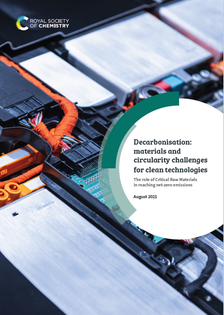Critical Raw Materials: summary of the ESED report
|
The RSC’s 20-page Environment, Sustainability and Energy Division (ESED) August 2021 report, Decarbonisation: materials and circularity challenges for clean technologies (The role of Critical Raw Materials in reaching net-zero emissions), examines what is needed to balance free will in markets whilst managing the resource base of critical raw materials.
The challenge is to reset our economic perspective, moving away from a linear economic model and towards a circular economic model. This may prove more difficult than anticipated because economic imperatives and international self-interest may be bigger obstacles than science-based solutions can address. It will require some lateral thinking about cooperation between government, industry, and the scientific community to introduce these changes. A significant amount of research and development is dedicated to the design of recovery technologies such as novel chemistries, engineering, reimagining product life cycles, and the recovery of potentially valuable minor components lost by current waste management techniques. |
This is all good, but without a coherent strategy to enable cooperation between competing companies to find the most viable way forward, the objectives are in danger of becoming unfulfilled because of vested self-interests or ‘beggar thy neighbour’ policies and practice.
The power to resolve these challenges lies with international and local politicians. To ensure the system works for everyone, with little or no inequality between providers of services, they will need to ensure accurate and thorough information sharing takes place, and best practices are applied.
The report recommends that the competition between ideas about how best to recycle particular materials is best left between academia and industry. However, there needs to be a significant, legally enforceable framework to direct participants to best practices. This framework will ensure positive outcomes, not only in recovering materials of reusable quality, but also in ensuring planning permission is granted for the sites that will conduct the recycling and the disposal of by-product waste in an ecologically sound and economic fashion.
Reference
Decarbonisation: materials and circularity challenges for clean technologies (The role of Critical Raw Materials in reaching net-zero emissions), ESED, RSC, August 2021; available for free online.
The power to resolve these challenges lies with international and local politicians. To ensure the system works for everyone, with little or no inequality between providers of services, they will need to ensure accurate and thorough information sharing takes place, and best practices are applied.
The report recommends that the competition between ideas about how best to recycle particular materials is best left between academia and industry. However, there needs to be a significant, legally enforceable framework to direct participants to best practices. This framework will ensure positive outcomes, not only in recovering materials of reusable quality, but also in ensuring planning permission is granted for the sites that will conduct the recycling and the disposal of by-product waste in an ecologically sound and economic fashion.
Reference
Decarbonisation: materials and circularity challenges for clean technologies (The role of Critical Raw Materials in reaching net-zero emissions), ESED, RSC, August 2021; available for free online.


